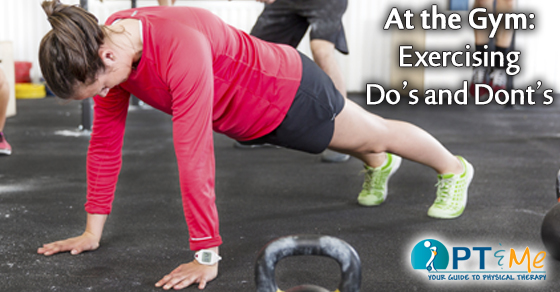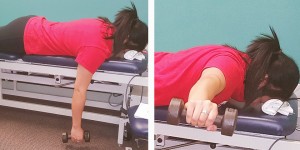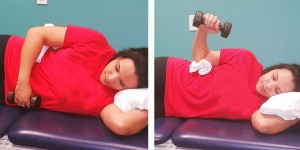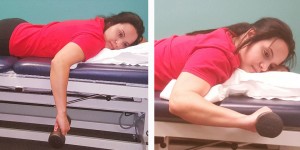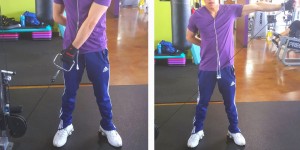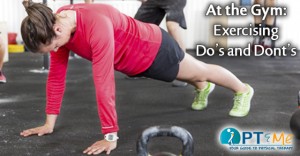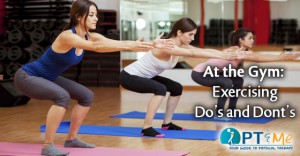In this new monthly series we examine the proper ways to exercise at the gym from start to finish. If you have any sudden significant increase in pain, swelling, or discoloration while performing or following exercise, discontinue immediately and contact your therapist at your next therapy session.
SCAPULAR STRENGTHENING
START POSITION
• Lay face down on the edge of the bench with arm hanging downward
• Rolled towel under forehead for support
ENDING POSITION
Arm raised straight to your side no higher than the torso with palms facing down
DON’T
• Arch your back when lifting dumbbell
• Lay with face turned sideways
• Raise the dumbbell too high
EXTERNAL ROTATION – SIDE LYING
START POSITION
• Side lying with elbow at 90⁰ bend
• Support the head and rolled towel under arm holding dumbbell
ENDING POSITION
Side lying with external rotation at the shoulder until you feel an anatomical stop at the shoulder (about 45⁰); keep elbow bent
DON’T
• Create rotation at the torso
• Don’t raise the arm from the towel
EXTERNAL ROTATION – PRONE
START POSITION
• Lay face down with head facing to the side
• Forearm hanging off table with elbow bent to 90⁰
• Bicep is on the bench and supported by a towel
ENDING POSITION
About 45⁰ of external rotation
DON’T
• Externally rotate past 45⁰
• Raise arm from the towel
D2 FLEXION
START POSITION
• Standing with feet shoulder width apart
• Hold handle with arm crossing body to opposite side
• Palm facing body.
ENDING POSITION
• Arm raised slightly above the shoulder (about 120⁰ which is slightly higher than shown) with thumb facing upward
• Creating a “disco” motion
DON’T
• Let thumb face sideways or downward at end of exercise
• Lean backwards or sideways to assist in exercise
• Shrug shoulders
This information about how to exercise at the gym was written by STAR Therapy Services, an outpatient physical therapy group with six locations in Houston, Texas. At Star Houston Therapy Services, their number one priority is the patient. They strive to provide individualized treatment with hands-on, compassionate care. They perform comprehensive evaluations and encourage patient input for treatment planning and goal setting. For more information click here.
View the complete Exercising Do’s and Don’ts series below:

